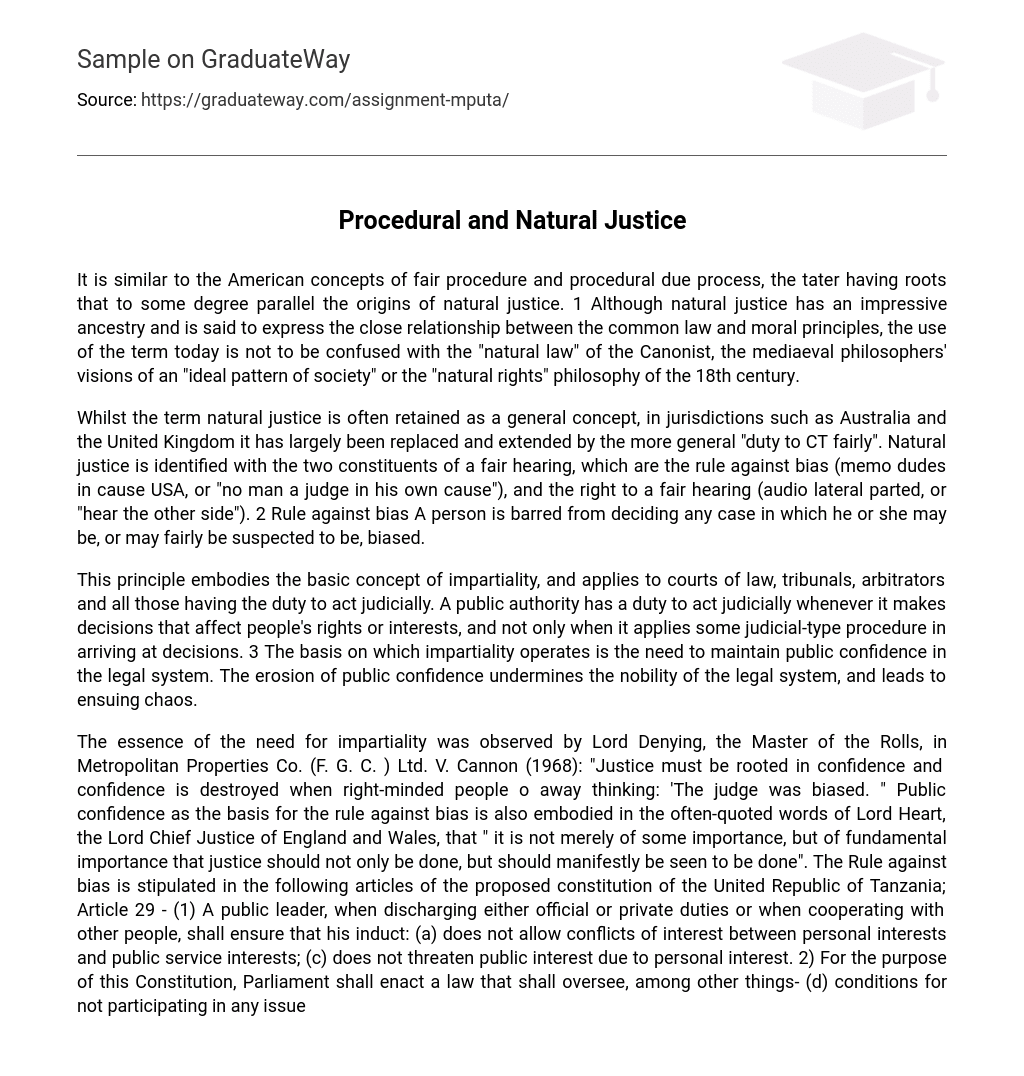It is similar to the American concepts of fair procedure and procedural due process, the tater having roots that to some degree parallel the origins of natural justice. 1 Although natural justice has an impressive ancestry and is said to express the close relationship between the common law and moral principles, the use of the term today is not to be confused with the “natural law” of the Canonist, the mediaeval philosophers’ visions of an “ideal pattern of society” or the “natural rights” philosophy of the 18th century.
Whilst the term natural justice is often retained as a general concept, in jurisdictions such as Australia and the United Kingdom it has largely been replaced and extended by the more general “duty to CT fairly”. Natural justice is identified with the two constituents of a fair hearing, which are the rule against bias (memo dudes in cause USA, or “no man a judge in his own cause”), and the right to a fair hearing (audio lateral parted, or “hear the other side”). 2 Rule against bias A person is barred from deciding any case in which he or she may be, or may fairly be suspected to be, biased.
This principle embodies the basic concept of impartiality, and applies to courts of law, tribunals, arbitrators and all those having the duty to act judicially. A public authority has a duty to act judicially whenever it makes decisions that affect people’s rights or interests, and not only when it applies some judicial-type procedure in arriving at decisions. 3 The basis on which impartiality operates is the need to maintain public confidence in the legal system. The erosion of public confidence undermines the nobility of the legal system, and leads to ensuing chaos.
The essence of the need for impartiality was observed by Lord Denying, the Master of the Rolls, in Metropolitan Properties Co. (F. G. C. ) Ltd. V. Cannon (1968): “Justice must be rooted in confidence and confidence is destroyed when right-minded people o away thinking: ‘The judge was biased. ” Public confidence as the basis for the rule against bias is also embodied in the often-quoted words of Lord Heart, the Lord Chief Justice of England and Wales, that ” it is not merely of some importance, but of fundamental importance that justice should not only be done, but should manifestly be seen to be done”. The Rule against bias is stipulated in the following articles of the proposed constitution of the United Republic of Tanzania; Article 29 – (1) A public leader, when discharging either official or private duties or when cooperating with other people, shall ensure that his induct: (a) does not allow conflicts of interest between personal interests and public service interests; (c) does not threaten public interest due to personal interest. 2) For the purpose of this Constitution, Parliament shall enact a law that shall oversee, among other things- (d) conditions for not participating in any issue or activities in which he has interest, either himself , his spouse, child, acquaintance, friend, or any of his close relations. 5 Article 185 – (3) Subject to the provisions of sub article (2), it shall be lawful for a Judge of the Court of
Appeal to deliver judgment or any other decisions concerned in the exercise of the jurisdiction he had before he was appointed Judge of the Court of Appeal provided that where ultimately that judgment or decision is challenged by way of appeal to the Court of Appeal, then in such circumstances that Judge of the Court of Appeal shall not have jurisdiction to hear that appeal. 6 Right to a fair hearing It has been suggested that the rule requiring a fair hearing is broad enough to include the rule against bias since a fair hearing must be an unbiased hearing.
However, the rules are often treated separately. It is fundamental to fair procedure that both sides should be heard. 7 The right to a fair hearing requires that individuals are not penalized by decisions affecting their rights or legitimate expectations unless they have been given prior notice of the cases against them, a fair opportunity to answer them, and the opportunity to present their own cases. Besides promoting an individual’s liberties, the right to a fair hearing has also been used by courts as a base on which to build up fair administrative procedures. It is now well established that it is not the character of the public authority that matters but the character of the power exercised.





